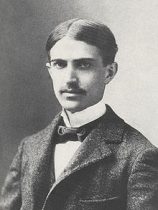
Crane was born on November 1, 1871, in Newark, NJ. His major works are the novels, Maggie: A Girl of the Streets and Red Badge of Courage and the short stories “The Open Boat”, “The Bride Comes to Yellow Sky”, and “The Blue Hotel.” Crane was an American short-story writer, poet, and novelist. He has also been credited with founding modern American naturalism.
He was the youngest of fourteen children. His parents were Reverend John Crowley Crane and suffragist Mary Helen Peck Crane. Crane spent less than two years at college then moved to New York City to live in a residence for medical students. While he was there, he freelanced his literary career and wrote his first novel, Maggie: a Girl of the Streets. This novel was not a success at first. Critics believed that Crane was heavily influenced by Darwinism. Although critics did not receive this novel well, two literary figures named Garland and Howell published positive reviews. It did not receive positive attention until 1896 when the second edition was published.
Crane lived a bohemian life during his time in New York City, — this would eventually catch up with him. Crane’s obsession with the psychology of combat sent him to Greece in April of 1898 where he reported on the Greco-Turkish war, bringing along Cora Taylor who is recognized as his common-law spouse. During this time, Crane published George’s Mother (1896), The Third Violet (1897) and Active Service (1899). Like the aforementioned, these works were not received well. Crane’s literary career was deteriorating and his finances were dwindling.
Through his life, Crane’s health slowly deteriorated. He had contracted everything from malaria to yellow fever which he contracted during his bohemian days and while he was in Cuba. Crane died in Germany June 5 in 1900 of tuberculosis, at the ripe age of 28.
Here’s an Interesting Fact: Crane passed away at the same age his sister Agnes had passed away.
Analysis of “Adventures of a Novelist“:
Crane describes one of the most infamous duels in life: whether or not one does what is morally right or what will be right for his or her reputations. As two women and a “reluctant witness” stand awaiting a cab, an officer arrests the women for soliciting two men who have walked by. One of the women is released right away because the “reluctant witness” is noted to be her husband – although this is inherently false – meanwhile, the other woman is brought to custody. The woman did not solicit those two men but the officer could only respond by saying that “she’s a common prostitute” (Crane, 315). That young woman is then brought down to the station and detained until her trial, where her fate would be decided. The “reluctant witness” tells his wife that he “can’t afford to do that sort of thing” (Crane, 316) when she refers to him going to the courthouse and protesting her demise. The witness plays with the idea of being turned down by an employer for protecting the honor of a prostitute. The man decides morality over reputation when the sergeant at the station says, “…as a man of good repute; so why interfere in this thing. As for this girl, I know her to be a common prostitute. That’s why I sent her back” (Crane, 318). The charges against the woman were false accusations, in order to “do” justice for the community. The witness states:
Thus—if the girl was wronged—it is to be seen that all circumstances, all forces, all opinions, all men were combined, to militate against her. Apparently, the united wisdom of the world declared that no man should do anything but throw his sense of justice to the winds in an affair of this description (Crane 318).
Once again, true justice was tossed for the “betterment” of the community. Especially for a woman, who was indeed powerless during this period.